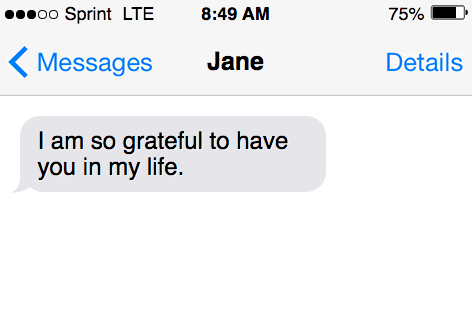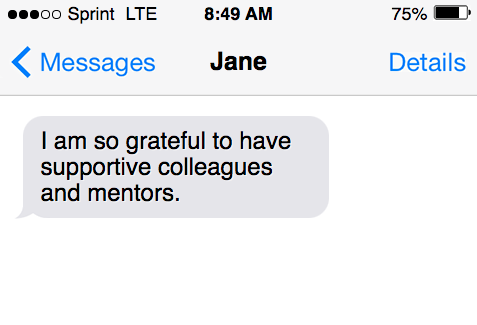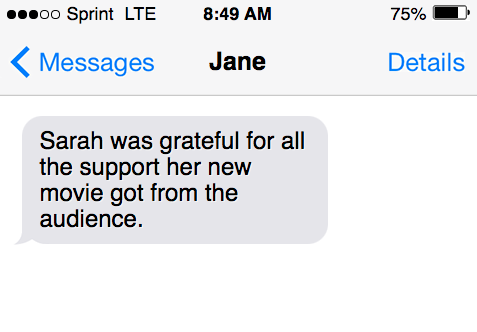The words “greatful” and “grateful” cause a lot of problems for those writing in the English language. The existence of the word “great” can be attributed to the reason behind this confusion. Why is it then “grateful?” Where did the “e” go when we refer to the word “great?”
The cause for confusion is understandable. Let’s break down the difference between these two words and how to use them properly (to prevent grammar mistakes).
Definition of grateful
The word “grateful” refers to gratitude.
A person intending to show gratitude or express gratitude (usually for something or someone that has made a positive impact on their lives) will use the word “grateful”.
It is used to express a feeling of thankfulness and appreciation for any type of blessing, kindness, or other positive act a person may have felt.

On the other hand, the word “greatful” does not exist in the English language.
This word is simply a misspelling of the word “grateful.”
| Word | Definition |
| Grateful (adjective) /ˈɡrātfəl/ | feeling or showing an appreciation of kindness; thankful. |
| Gratitude (noun) /ˈɡradəˌt(y)o͞od/ | the quality of being thankful; readiness to show appreciation for and to return kindness. |
Difference between grateful and greatful
Remember, the word “greatful” is not an accurate word in the English language.
This incorrect spelling is derived from the word “great” which means amazing, marvelous, or big.
In our minds, we often associate these same thoughts with the idea of being “grateful.” As a result, the use of a word like “greatful” gets written (although, makes no sense).
The word “greatful” simply isn’t part of any dictionary. It is a grammar mistake.
The word “grateful,” on the other hand, is derived from the word “gratitude” and refers to being “full of gratitude.”

The word “grateful” gets made by combining “grat + ful” (and makes perfect sense). It’s typically the word that many writers are looking for when they’re desiring to show appreciation.
The only difference between the two is that “grateful” is an accurate word, whereas “greatful” is just a misspelling.
Which form is correct?
The word “grateful” is the correct form and spelling.
The word “greatful” is incorrect. Simply because it is not an accurate word. Typically, it is not a misspelling because of how it is getting used. But rather, misspelled as the incorrect form to express an emotion.
This spelling points to a different word that does not need the addition of the suffix “ful.”
Are they the same?
The words “grateful” and “greatful” are not the same.
However, those who get mixed up when using them, typically use them with the same intention.
When a person uses the word “greatful” their intent is to express gratitude.
This shows that they are unaware of the correct spelling and want to display the same emotion that the word “grateful” expresses. If you are the recipient of a message with this misspelling, understand the intent behind it.
When to use grateful
The word “grateful” can get used in any context where the writer wants to express gratitude.
The misspelling of the word “gratitude” arises from the entirely different situation. Although, is a common misspelling as well.
The word “grate,” which means to shred something finely, adds to the clarity that the word we are looking for is not this.
Often, people cannot connect the relationship between “gratitude” and “grateful,” which leads to misspellings. These two words seem very different from each other.
Remember that “grate” and “grateful” are not the same. To “grate” would mean to finely shred. And being “grateful” means to show appreciation to another person or have appreciation. Although to be “greatful,” is a misspelling. And to be “great” is to be good at something or excellent.
Confusing, isn’t it? Let’s break it down with some sentence examples.

Sentence examples
Some sentence examples will further help understand what the word means and how it should get used.
- I am so grateful to have you in my life.
- I am so grateful to have supportive colleagues and mentors.
- Sarah was grateful for all the support her new movie got from the audience.
- I am grateful to have a loving and healthy family.
- It is good practice to be grateful every day for everything you have.
- Waking up every morning happy and healthy is a blessing for which everyone should be grateful.
- You should be grateful that everyone showers you with so much love.
- I am grateful for all the blessings God has given me today.
- Keeping a gratitude journal and writing one thing you are grateful for every day will positively impact your life.
- Every new day is an opportunity to achieve something great. Be grateful for it.
When to use “greatful”
The word “greatful” should never get used.
It is not a legitimate word recognized in the English language.
No matter which sentence or context a person uses this word in, it will be wrong.
How to remember which form to use
Remembering the correct form to use is something a lot of people struggle with.
To avoid making mistakes, simply remember that the word “grateful” has to do with gratitude and not with something or someone being great. For example, “great-ful.”
In contrast, the other spelling is entirely incorrect and should never get used.
Conclusion
The words “grateful” and “greatful” can often trip even experienced English speakers and writers. A simple “e” letter can be tricky.
Remember, that something is “gratitude” and so it is “GRAT-ful or “GRATE-ful.”
Inside this article
Fact checked:
Content is rigorously reviewed by a team of qualified and experienced fact checkers. Fact checkers review articles for factual accuracy, relevance, and timeliness. Learn more.
Core lessons
Glossary
- Abstract Noun
- Accusative Case
- Anecdote
- Antonym
- Active Sentence
- Adverb
- Adjective
- Allegory
- Alliteration
- Adjective Clause
- Adjective Phrase
- Ampersand
- Anastrophe
- Adverbial Clause
- Appositive Phrase
- Clause
- Compound Adjective
- Complex Sentence
- Compound Words
- Compound Predicate
- Common Noun
- Comparative Adjective
- Comparative and Superlative
- Compound Noun
- Compound Subject
- Compound Sentence
- Copular Verb
- Collective Noun
- Colloquialism
- Conciseness
- Consonance
- Conditional
- Concrete Noun
- Conjunction
- Conjugation
- Conditional Sentence
- Comma Splice
- Correlative Conjunction
- Coordinating Conjunction
- Coordinate Adjective
- Cumulative Adjective
- Dative Case
- Determiner
- Declarative Sentence
- Declarative Statement
- Direct Object Pronoun
- Direct Object
- Diction
- Diphthong
- Dangling Modifier
- Demonstrative Pronoun
- Demonstrative Adjective
- Direct Characterization
- Definite Article
- Doublespeak
- False Dilemma Fallacy
- Future Perfect Progressive
- Future Simple
- Future Perfect Continuous
- Future Perfect
- First Conditional
- Irregular Adjective
- Irregular Verb
- Imperative Sentence
- Indefinite Article
- Intransitive Verb
- Introductory Phrase
- Indefinite Pronoun
- Indirect Characterization
- Interrogative Sentence
- Intensive Pronoun
- Inanimate Object
- Indefinite Tense
- Infinitive Phrase
- Interjection
- Intensifier
- Infinitive
- Indicative Mood
- Participle
- Parallelism
- Prepositional Phrase
- Past Simple Tense
- Past Continuous Tense
- Past Perfect Tense
- Past Progressive Tense
- Present Simple Tense
- Present Perfect Tense
- Personal Pronoun
- Personification
- Persuasive Writing
- Parallel Structure
- Phrasal Verb
- Predicate Adjective
- Predicate Nominative
- Phonetic Language
- Plural Noun
- Punctuation
- Punctuation Marks
- Preposition
- Preposition of Place
- Parts of Speech
- Possessive Adjective
- Possessive Determiner
- Possessive Case
- Possessive Noun
- Proper Adjective
- Proper Noun
- Present Participle
- Prefix
- Predicate



